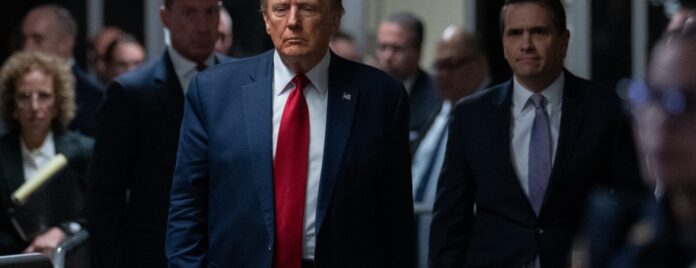Donald Trump
said he reached out to the world’s biggest insurance companies to seek help in arranging an appeal bond covering the $454 million verdict against him in New York’s civil fraud suit, and none would take his real estate as collateral. They all want cash and Trump says he doesn’t have enough.
The real estate mogul and former president will be forced to hold a “fire sale” of his properties to raise enough cash if the bond isn’t waived while he challenges the verdict, Trump
said in a filing
Monday with a New York appeals court. The appeal bond is due March 25 if the requirement isn’t put on hold.
Trump’s lawyers argued that his team has spent weeks trying to arrange a bond after the verdict was issued, adding that “diligent efforts since that time, including countless hours negotiating with one of the largest insurance companies in the world have proven that obtaining an appeal bond in the full amount of the judgment is not possible under the circumstances presented.”
The filing is the latest sign that Trump is facing a cash crunch after losing two civil trials this year that require him to pay more than $540 million in penalties, complicating his crowded legal calendar as he campaigns to return to the White House amid a torrent of courtroom troubles that includes four criminal prosecutions. Trump denies wrongdoing in all the cases, and argues the New York fraud verdict seeks “to destroy a successful business.”
Trump will have to convince the appeals court that the forced sale of his properties will cause harm to him and his business that cannot be reversed even if he ultimately prevails over the verdict. He has argued that such harm is likely because he’d have to sell his properties in a down market.
The appeals court could rule at any time on Trump’s request. New York Attorney General
, who won a lawsuit accusing Trump of inflating the value of his assets for more than a decade, has said his request should be denied because he cannot be trusted-bsp-bb-link>.
“Simply put, a bond of this size is rarely, if ever, seen,” Gary Giulietti-bsp-person>, a Lockton Cos. executive who was hired by Trump to help arrange a bond, said in an affidavit with the court filing. “In the unusual circumstance that a bond of this size is issued, it is provided to the largest public companies in the world, not to individuals or privately held businesses.”
The former president worked with
’s Federal Insurance Co. to post a $91.6 million bond-bsp-bb-link> earlier this month to appeal a verdict against him in E. Jean Carroll’s defamation suit, after a judge in that case declined to put the bond on hold while he appeals. The bond document didn’t specify what Trump posed as collateral.
Approached 30 Companies
In Monday’s filing, Trump said he has approached about 30 surety companies through four separate brokers to reach his conclusion that the requirement for cash or cash equivalents makes such a bond “commercially unattainable for a privately owned company.”
“Such would be the case even for a company with billions of dollars in real estate unless they have cash or cash equivalents approaching $1 billion so as to collateralize the bond and have sufficient capital to run the business and satisfy its other obligations,” Giulietti said in his affidavit. “While it is my understanding that the Trump Organization is in a strong liquidity position, it does not have $1 billion in cash or cash equivalents.”
Trump said that surety companies typically require collateral of approximately 120% of the amount of the judgment. He also said that surety companies charge bond premiums of approximately 2% per year with two years in advance, which would cost an extra $18 million, which he called “crippling and punitive.”
Cash Crunch
Trump testified last year to having about $400 million in cash, a figure that was far exceeded by the verdicts in the Carroll case and New York’s fraud lawsuit. And because such bonds require collateral of 110%-120%, the amount soared to about $600 million, which is the estimated value of all of Trump’s liquid assets. The Bloomberg Billionaires Index-bsp-bb-link; estimated Trump’s net worth at $3.1 billion before the verdicts.
James has argued that without a full bond, Trump could attempt to avoid paying the fine if his appeal fails. In a court filing last week, she rejected his suggestion that a bond isn’t necessary because his ownership interest in his 40 Wall St. tower alone was sufficient to pay the fine if he lost.
The attorney general said she wants to see proof that surety companies refused to accept the skyscraper as collateral and that sureties “have refused to accept this property, his other real estate interests, or his private jets or helicopters as collateral for an appeal bond.”
Justice
who oversaw the trial without a jury, found that Trump inflated the value of his assets by billions of dollars a year for more than a decade to get better terms on loans, reaping hundreds of millions of dollars in “illegal profit.” He ordered Trump to pay a $355 million fine plus $99 million in pre-trial interest and banned him from running any New York-based company for three years.
Trump’s sons Eric Trump and Donald Trump Jr. were also found liable and ordered to pay a total of nearly $10 million. They are also appealing.
(Updates with affidavit by expert hired to help arrange bond.)
To contact the reporters on this story:
Patricia Hurtado-bsp-person> in Federal
Court in Manhattan at pathurtado@bloomberg.net
To contact the editors responsible for this story:
Misyrlena Egkolfopoulou-bsp-person> at megkolfopoul@bloomberg.net
Peter Jeffrey, Steve Stroth
© 2024 Bloomberg L.P. All rights reserved. Used with permission.
